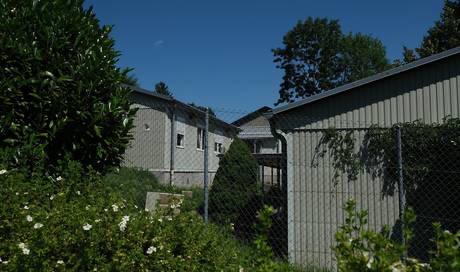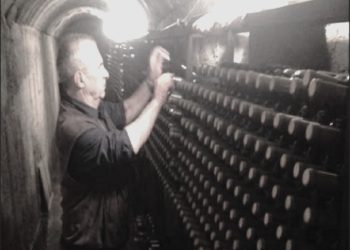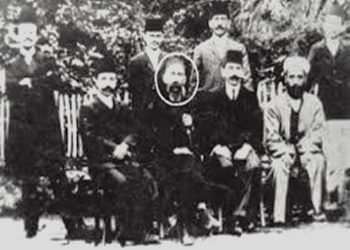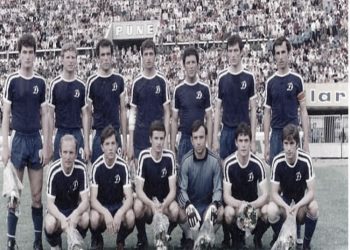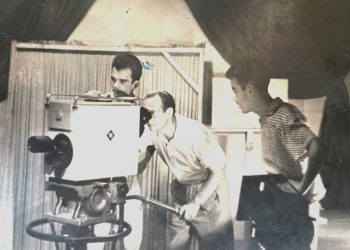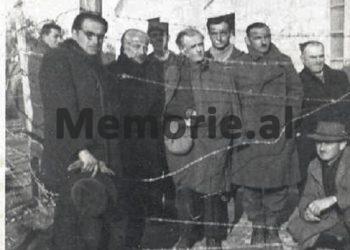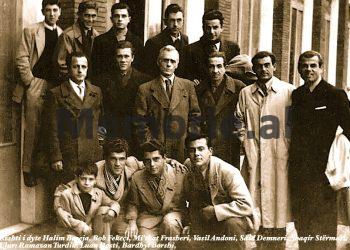Dashnor Kaloçi
Part seven
Memorie.al/publikon the unknown story of Jetullah Gashi, originally from the village of Mramor in Prishtina, who in 1964, when he was a high school student, decided to flee and cross the state border in the area of the village of Zogaj in the district of Tropoja, where for several days, interrogating him in the Internal Affairs Branch of the city “Bajram Curri”, they brought him to the town of Shijak, placing him in a State Security base, which was called “The filtering center of Kosovar emigrants”, who were fleeing Yugoslavia and coming to Albania, where for several months he was subjected to intensive investigation by State Security officers coming from the Ministry of Internal Affairs and covering “Kosovo emigration”.
He was sent to the district of Korça where he finished high school in the town of Maliq and then in Tirana, where he attended higher university studies at the Faculty of Medicine, which he completed in 1971 and was appointed in Elbasan as a nearby doctor. The hospital of that city. His arrest in 1977 after some time of surveillance and persecution by the State Security organs, “as an agent of the UDB”, where after several months of inhuman torture, he was sentenced to 25 years in political prison, which suffered in the camps of Spaç, Qafë-Barit, Burrel, etc., the extraordinary gesture of Jetullah Gashi when he was serving his sentence, handing over the white shirt of the doctor and working in shifts in the gallery of Spaç, from where he was released at the beginning of 1991, with the overthrow of the communist regime.
It was August 30, 1964, when I, after cutting the train ticket from Prishtina to Skopje (where I was working with my father), all the way, I was just thinking how I would get to Albania, which I had been grinding for so many days. In head. At that time I did not have any information about the state border, Yugoslavia – Albania and based on this fact, I went to the bus station in Skopje, where I cut the bus ticket to Gjakova and arrived there in the late hours of the night. I got off the bus and did not know where to go, as I had never been to Gjakova. I made every effort to avoid people and took the road that had less traffic. At the end of this road, I saw a bakery, bought some buns and continued the same road direction in the dark of night. On the right side of the road, I saw a fence, which I crossed and entered the garden. I decided to sleep there. Near the siege, I found a safe place to protect myself, as there were occasional dog barks, but after a while they ceased. Tired I had fallen asleep. I woke up in the morning, after looking around the place, got up, crossed the fence and went out on the street again. My cousin Kadriu had told me that the border to Albania crosses the tops of some bare hills “. This is how 75-year-old Jetullah Gashi from Kosovo remembers the moment of his escape from Yugoslavia to Albania, where he was arrested after graduating from the Faculty of Medicine in Tirana and serving as a doctor for several years in the hospital of the city of Elbasan, in April 1977. By the State Security, being charged as a “UDB agent” and sentenced to 25 years in prison. Torture during the investigation and the sentence of 25 years in prison, the long ordeal in the camps and prisons of the communist regime of Enver Hoxha until the beginning of 1991, being released with the last convicts who came out of the “communist hell”, leaving for Switzerland to his relatives, returning to Albania and finally leaving for Kosovo, where he still lives with his family. Regarding these and other events and facts from his painful life, Doctor Jetullah Gashi, testifies exclusively for Memorie.al
Continued from the previous issue
Mr. Jetullah, during the period of serving your sentence in camps and prisons, did you receive a reduced sentence with any amnesty?
By the end of 1982, the then communist regime ostensibly announced an amnesty for political and ordinary prisoners. We political prisoners gained almost nothing. Most of the political prisoners who had done over 20 years, did not benefit. Rexhep Koçi, who had spent over 18 years in prison, for the remaining 13 days of his sentence, went to ask the Command, and they told him: if you are not released, you will end these 13 days.
For 13 days they did not release him with that amnesty…?!
Yes, they did not release him for 13 days and Rexhepi was very upset and he was afraid that during the remaining two weeks he could be re-sentenced again. Rexhepi had worked hard to take advantage of these 4-5 days and meanwhile Sander Sokoli and I tried to calm him down, seeing that he was very sad and weak. The next day when we left for work, I was looking at Rexhepi who did not have the desire and strength to climb the hill, to the gallery! I asked him several times if he was sick. “No”, said Rexhepi, “I am a good doctor”. We arrived at the barracks, where we would change clothes, with those of work to the gallery. I came out of the barracks first and was waiting for Rexhepi outside, but he was not coming out and I called him again, and he replied: “Walk, for I am following you.” And these were the last words I heard from that steel man. I left and went to the front of the gallery to work, and as soon as I started placing the wooden bodies, one of the convicts approached me. And he said to me: “Doctor soon, they are asking us to go out”.
What had happened to Rexhepi?
When we went outside, I learned that the soldier on duty had fired an automatic weapon at Rexhepi, because, according to them, he had tried to pass the siege wire, which was not more than a meter and a half away, from the barracks where we changed clothes. That we stayed in the camp, with that of work that we entered the gallery. The convicted doctor, Fadil Spahiu, with the help of the doctor, Isuf Hoxha, had tried to give the ambulance to Rexhepi, but Rexhepi did not even reach the camp, alive.
What happened next?
All the leaders of the Command had come out and watched us with the greatest ferocity, lest we would react! After this happened it seemed that there was a tense and somewhat frightening situation in the camp by the Command and so they doubled the guards, who were on standby and armed towards us. The next day the daily routine towards the gallery would start, but I did not have Rexhepi anymore! All the way to the gallery, I cursed myself as to why I left Rexhepi alone, knowing that he had a vision problem and I thought I was completely convinced that: he could have crossed the perimeter wire by mistake? I was feeling bad and I went alone to the front of the work, and out of boredom, I worked and very quickly placed the troops in the gallery.
Apart from this event with Rexhepi, what were the most difficult moments during the serving of the sentence?
After the loss of my friend Rexhep Koçi, it was another very difficult moment that I remember, not only of me, but also of my six accomplices, when they forced us to go down to the gallery on a stove, over 40 meters high, going through great vicissitudes, which endangered our lives. Another case, when my material (pyrite) collapsed, was a certain death, if I did not maneuver, and came out crawling, from that hard working front. I was very sad when I was transferred to Burrel Prison at the end of July 1984, where I met Nuredin Skrapar, who told me that: “By order of the commander, Edmond Caja, the police tortured Sander Sokolin, until he broke his spine and as a result, Sander, had passed away “.
When you finished your sentence, did you stay in Albania or did you go to Kosovo?
After my release from prison on February 6, 1991, I stayed in Tirana until May 30, and that day I traveled by air to Geneva, Switzerland. This was made possible by my nephew, who works and still lives in Geneva today, Halil Abdullai, who provided me with a visa, as a visitor with the right of departure on the appointed date, which was May 30, 1991.
In what city or canton did you go to Switzerland and how long did you stay there?
During my stay in Geneva with my nephew, Brother Hajrullai and Uncle Bajrush Brestovci came to visit me. After the deadline expired, under the laws of the Swiss state, my nephew recommended that I apply as a political asylum seeker at a center located in Geneva. I stayed here for about a week, and after this time, we were interviewed 5-6 times and finally they asked me where I thought to stay in Switzerland, after my term expired there, which was the competence of the Swiss authorities. In Lugano, I stayed three weeks and then we were transferred to Zurich, Oberengstringen Frangatoat.
What was it, the center of residence of asylum seekers?
Yes, in this asylum center were all Albanians. Half were citizens of Albania and the rest were Kosovo Albanians. The Swiss state paid us 208 francs a month and we received them in four installments, 52 francs each week. In the center we had all the conditions provided, such as sleeping, cleanliness and hygiene, kitchen for cooking, as well as refrigerator and TV, we had in each room, which were with central heating.
How did the relations between the asylum seekers of Albania and those of Kosovo go and how were they there?
They went very badly and often there were quarrels and offensive clashes between the Albanians of Albania and the Albanians of Kosovo, who did not believe the stories of the Albanian brothers, saying: “Enver Hoxha did well, because no one has imprisoned or interned, without doing anything”.
When you heard these thoughts that our brothers from Kosovo had about the deeds of Enver Hoxha, how did you feel that you had suffered on your back the tortures and the long prison?
Often, as a mediator, I have tried to convince my Kosovar compatriots, telling them: ‘all this that the Albanian brothers are telling is true. These things that I am telling you have happened to me and many other Kosovars, who have gone to Albania, accusing us with all kinds of accusations, ostensibly to the detriment of Albania and in favor of Tito’s Yugoslavia ‘. After an intensive work I did with Kosovars separately, most were convinced of the reality that existed in Albania during the Enver dictatorial regime.
How long did you stay in Switzerland?
I stayed in Switzerland for about 1 year, as I could not get political asylum even though I got a lawyer for my defense, it was impossible and so I returned to Tirana, on December 18, 1992.
How is it possible that they were not granted political asylum in Switzerland, even though you had been in the political prisons of the communist regime of Enver Hoxha, when at that time political asylum was granted to many of your persecutors, who are still today in those western states as political asylum seekers?
In order to gain political asylum, I needed a series of documents from Albania, which not only did I not have, but there was no one to send them to me, and so this was impossible. As for our persecutors who were given political asylum, it is completely inexplicable and I do not know what to tell you. These absurdities that already belong to the past, we have talked too many of the accomplices, every time we meet!
After returning to Albania, what did you do, where did you go?
As soon as I got off at Rinas airport, I took a taxi and went to Xhavit Shatku, on “Bajram Curri” street, near the Madrasa. Skënderi was a former political prisoner from the communist regime and before his sentence he had worked as a mathematics teacher in Peshkopi. He was charged as an agent of the Yugoslav UDB and was sentenced to 25 years in prison, which he served in Burrel Prison. (With Skënder I was released from prison on February 6, 1991 and together we went to Tirana, to Xhavit Shatku, who were first cousins, ie brothers fathers). Through my nephew in Switzerland, Halil Abdullai, my brother Hajrullai was called and told that: ‘Jetullain has been returned to Tirana’. My brother came to Tirana, for the first time on December 29, and after talking to me, he told me: that my uncles, Bajrush and Metush Brestovci, would pass us at the Hani i Elezit customs without any obstacles. Then I cut the ticket for the Tirana-Skopje bus and in Skopje I met my uncles, who calmed me down, so that I would not worry, that all measures had been taken to cross the border without any problems. And so it happened, after 29 years, my foot was stepping on the land of Kosovo again, exactly on dt. December 31, 1992. Accompanied by uncle Bajrush and brother, he entered the backyard of Pristina, near the Jewish (Jewish) cemetery – Taip Zeka Street, where my brothers and I still live.
How do you remember that meeting with your family that you had not seen since 1964, when you decided to leave and came to Albania?
Ehhh (cries), after I hugged my father, and then my uncles, Maliqi and Çerkina, my brothers and sisters, my aunt, etc., with impatience and longing, I was waiting to meet my mother, the daughter of Zek Brezovci, the sister of Uncle Bajram of Naman! After I asked my father and uncles several times, (cries) at last my father told me that my mother had passed away, a few years ago. My father told me: “Your mother left us a trust, do not tell her that my son is upset”. As much as a person can withstand the waves of life, at that moment my tears burst, I cried as a child.
Today, after so many years, given what happened to you here (arrest, torture, prisons), do you have any regrets, why did you make that decision, to come to Albania?
Ehhh, did I regret coming to Albania?! I am telling you that: At the time I decided to flee to Albania, I was not at all interested in who was leading it. It never left my mind at that time in Kosovo, when we went to school, on the snow-covered road, there were clear traces of the blood of men, who were arrested and tortured on school premises by UDB officers, during the action for “weapons collection”. The decision of Professor Mania Grbic, leaving me in class, which made me miss the school year and this became the reason for me to finally decide to flee to Albania. /Memorie.al
Continues tomorrow




